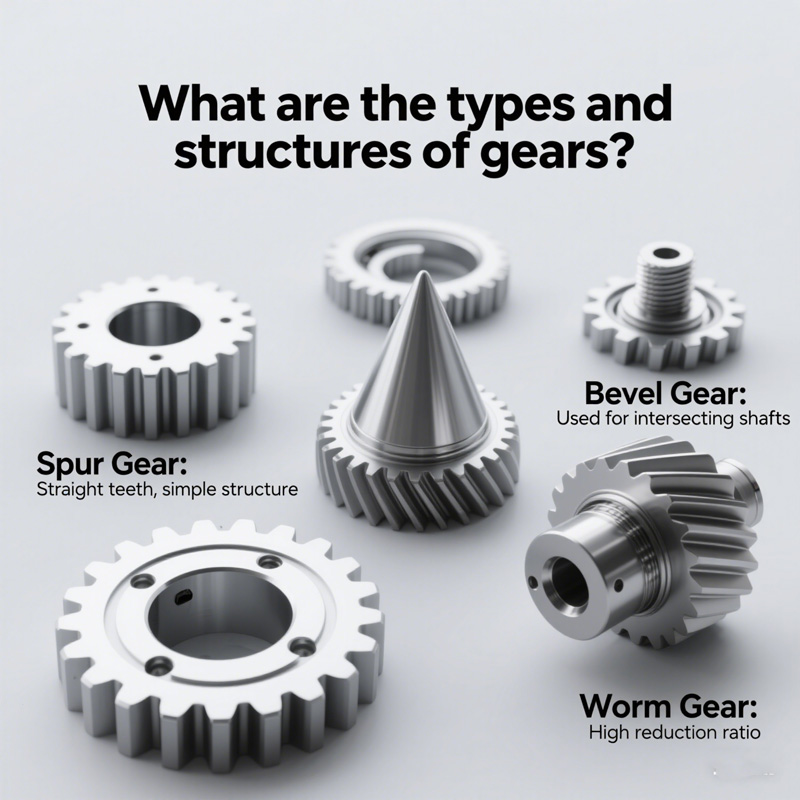What are the types and structures of gears?
Gears are the core of power transmission, ensuring smooth torque transfer and reliable performance in critical systems. This guide explores the main types of gears, their working principles, and applications in automotive, industrial machinery, wind power, and aerospace. With Weforging’s precision forging and CNC machining, you gain durable gear solutions that meet ISO and AGMA standards.

Main Types of Gears
| Gear Type | Characteristics | Applications |
|---|---|---|
| Spur Gears | Teeth parallel to axis, simple structure, low cost; suitable for low/medium speeds | Internal gears, gear rings, low-speed and heavy-load equipment |
| Helical Gears | Teeth arranged in spiral; smoother meshing, lower noise | Automotive gearboxes, industrial reducers, high-speed/high-load transmission |
| Bevel Gears | Change direction of transmission; spiral bevel gears more stable | Differentials, machine tools, high-performance transmission |
| Worm Gears | Compact structure, high speed ratio, self-locking capability | Speed increasers, elevators, conveyors, heavy machinery |
| Planetary Gears | System of sun gear, planetary gears, and gear ring; high torque density, stability | Flow control equipment, wind turbines, automatic transmissions |
Key Application Fields of Gears
Automotive Industry — Automotive gears are essential in gearboxes, differentials, and steering systems. Precision automotive gear manufacturing ensures smooth shifting, reduced wear, and better fuel efficiency. Weforging delivers forged gears with tight tolerances for long-lasting performance in cars, trucks, and heavy vehicles.
Industrial Machinery — In CNC machines, injection molding equipment, and automation systems, gears enable high-precision motion control. Durable forged gears extend machinery lifespan and reduce downtime. Our custom gear solutions are designed to handle heavy loads and continuous operation.
Wind Power and Energy — Planetary gear systems in wind turbines convert low-speed rotation into high-speed power. Weforging supplies forged gears with excellent fatigue resistance, built to withstand harsh environments and long service cycles.
Aerospace Industry — Aerospace gears must endure extreme temperatures and pressures. From landing gear to engine components, forged alloy gears provide precision, safety, and durability. Weforging’s aerospace-grade gear manufacturing complies with ISO and AGMA standards.
How to Choose a High-quality Gear Manufacturer?
Materials & Processes – Premium alloy steels and precision forging for strength and wear resistance.
Customization – Tailored gear solutions based on size, load, and application.
Quality Certifications – ISO, AGMA, and PPAP compliance with in-house labs.
Advanced Equipment – Modern CNC and forging presses ensure strict tolerances.
Technical Support – Engineering consultation and after-sales service reduce risk and downtime.
Recommended quality gear supplier: Weforging manufacturing
If you are looking for high-strength, high-precision gears, Weforging is your trusted partner. As an integrated factory, we combine forging, CNC machining, laboratories, and gear manufacturing to deliver reliable transmission components.
Our advantages include:
Advanced Technology: Using closed-die forging and CNC precision machining to ensure mechanical strength and dimensional accuracy.
Material Options: Wide selection of carbon steel, alloy steel, and stainless steel for diverse working conditions.
Industry Experience: Serving automotive, mining machinery, and wind power with global customers.
Strict Quality Control: Certified by ISO with full testing such as hardness and metallographic analysis.
With proven expertise and rigorous standards, Weforging provides custom forged gears and precision components that deliver durability, efficiency, and performance for demanding industries.
Gear Maintenance and Common Issues
Lubrication Management – Regular lubrication prevents wear and noise.
Wear and Fatigue – Routine inspection avoids costly downtime.
Assembly Calibration – Proper alignment reduces stress and extends service life.
Conclusion
Gears, as the “heart” of mechanical transmission, their performance directly affects the efficiency and lifespan of the entire system. Choosing a professional manufacturer not only enables you to obtain high-quality products but also allows you to enjoy customized services and technical support. Whether it’s standard gears or special requirements, understanding the technical parameters in advance and optimizing the maintenance strategy will help you maximize the return on investment.
Contact Weforging right now for your exclusive gear solution!

